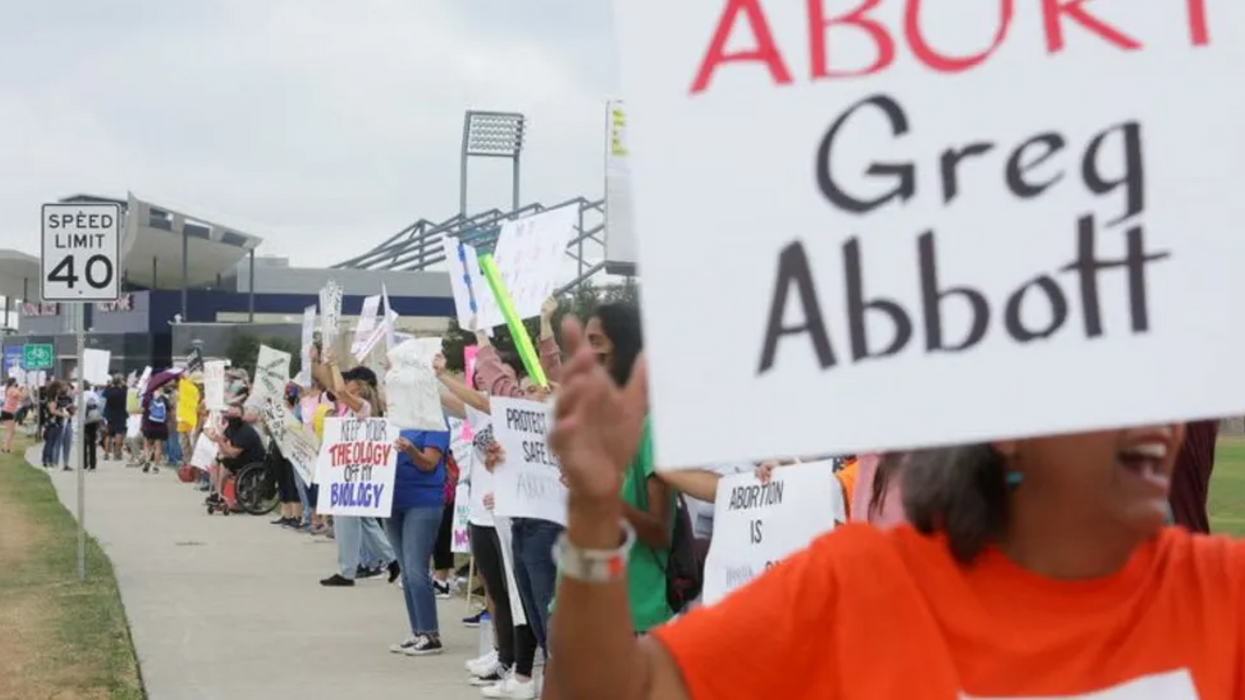
Rally at Texas Ca;pitol protests highly restrictive abortion laws signed by Gov. Greg Abbott
By Richard Webner and Julia Harte
AUSTIN, Texas (Reuters) -Women's rights advocates gathered at the Texas Capitol on Saturday to protest against the country's most restrictive abortion law, launching a series of 660 marches around the United States in support of reproductive freedom.
A crowd of more than 1,000 protesters assembled in sweltering heat in front of the building where lawmakers earlier this year passed a measure that bans abortions after about six weeks, which Governor Greg Abbott later signed.
"Abort Abbott" appeared on several of the demonstrators' signs and T-shirts, while others sported the Texas state slogan, "Come and Take It" next to a drawing of a uterus.
"Our vision for Texas is still rugged and resilient," Ann Howard, a commissioner of Travis County, which includes Austin, told the crowd. "But it's also open and inclusive and compassionate. Our Texas safeguards individual freedoms."
In Washington, D.C., protesters were set to march to the U.S. Supreme Court two days before the court reconvenes for a session in which the justices will consider a Mississippi case that could enable them to overturn abortion rights established in the landmark 1973 Roe v. Wade case.
In a 5-4 decision on September 1, the justices denied a request from abortion and women's health providers to block enforcement of the near-total ban in Texas.
"This is kind of a break-glass moment for folks all across the country," Rachel O'Leary Carmona, executive director of Women's March, said before most of the demonstrations that the group organized got under way.
"Many of us grew up with the idea that abortion would be legal and accessible for all of us, and seeing that at very real risk has been a moment of awakening," she said.
Carmona said the number of marches scheduled for Saturday is second only to the group's first protest, which mobilized millions of people around the world to rally against former President Donald Trump the day after his inauguration in 2017.
The coast-to-coast marches were set to include not only Austin, but other cities in Texas, a flashpoint in the nation's battle over abortion rights.
The state's so-called "heartbeat" law, which went into effect on Sept. 1, bans abortion after cardiac activity is detected in the embryo, usually around six weeks. That is before most women know they are pregnant and earlier than 85% to 90% of all abortions are carried out, experts say.
Texas also lets ordinary citizens enforce the ban, rewarding them at least $10,000 if they successfully sue anyone who helped provide an illegal abortion.
In the month since the law was enacted, hundreds of women in Texas have driven to other states for abortions, while others have sought abortion-inducing pills by mail or visited "crisis pregnancy centers" that encourage women not to get abortions. Abortion clinics are struggling to survive as patient visits decline and some staff quit.
Abortion rights advocates and the U.S. Justice Department have challenged the law in state and federal courts, arguing that it violates Roe v. Wade.
A federal judge in Austin on Friday heard the Justice Department's request https://www.reuters.com/world/us/biden-administration-urge-halt-strict-texas-abortion-law-2021-10-01 to block the law temporarily while its constitutionality is challenged.
(Reporting by Richard Webner in Austin and Julia Harte in New York; Writing by Peter Szekely; Editing by Colleen Jenkins and Daniel Wallis)
- Refusing To Back Abortion Rights Bill, Collins Shows True Colors At ... ›
- Former Bush Speechwriter: GOP May Soon 'Regret' Texas Abortion ... ›
- Federal Judge Blocks Enforcement Of Texas Abortion Law - National Memo ›








